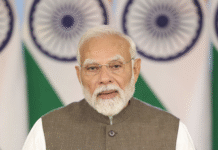New Delhi— India’s macroeconomic outlook remains robust in the near term, supported by stable growth projections for 2025, declining inflation, and continued monetary easing, according to N. Chandrasekaran, Chairman of Tata Consumer Products.
In the company’s FY25 annual report, Chandrasekaran emphasized that resilient and visible supply chains are more crucial than ever, particularly as global growth forecasts continue to be revised downward.
He noted that despite global economic volatility, India remains a bright spot, buoyed by strong demographics and sound economic fundamentals. “India’s direct exposure to the U.S. is limited, with exports to the U.S. accounting for just over 2% of GDP—among the lowest in emerging markets,” he added, pointing to shifting global trade dynamics.
Chandrasekaran also highlighted the company’s growth drivers, including modern trade, e-commerce, and the rapid expansion of quick commerce. “Quick commerce has witnessed exponential growth, but physical distribution still plays a vital role,” he said. “Our integration of AI and machine learning into the supply chain has enhanced demand forecasting, optimized inventory management, and improved overall efficiency.”
He stressed that businesses must remain agile and responsive in today’s complex global environment. “The need for strong, resilient, and transparent supply chains has never been more urgent. Emerging technologies like generative AI, robotics, and blockchain are not just industry buzzwords—they’re essential tools for transformation,” he said.
Chandrasekaran also pointed to the global green energy transition, which is fueling major investments in areas such as electric mobility, renewable energy, hydrogen, and sustainable fuels.
At Tata Consumer, the company has adopted an omnichannel strategy to tap into evolving consumer trends. “Millennials and Gen Z are expected to drive a growing share of consumption—by some estimates, they will account for 76% of total consumption by 2030,” he noted. (Source: IANS)








